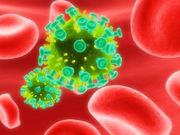Increased risk of allograft loss, death for HIV-positive patients receiving protease inhibitor ART
FRIDAY, July 14, 2017 (HealthDay News) — For HIV-positive kidney transplantation (KT) recipients, outcomes are worse for those on a protease inhibitor (PI)-based versus non-PI-based antiretroviral therapy (ART) regimen, according to a study published online July 11 in the American Journal of Transplantation.
Deirdre Sawinski, M.D., from the University of Pennsylvania Comprehensive Transplant Center in Philadelphia, and colleagues examined outcomes for HIV-positive KT recipients by ART regimen. The authors linked IMS pharmacy fills with data from the Scientific Registry of Transplant Recipients. A total of 332 KT recipients with pre- and post-transplant fills were classified according to PI or non-PI-based ART at the time of transplant (88 and 244 patients, respectively).
The researchers found that, compared with those on non-PI regimens, recipients on PI-based regimens were significantly more likely to have an estimated post-transplant score >20 percent (70.9 versus 56.3 percent). The risk of allograft loss was increased for PI-based regimens versus non-PI regimens (adjusted hazard ratio, 1.84), with the greatest risk seen in the first post-transplant year (adjusted hazard ratio, 4.48); increased risk of death was also seen for PI-based versus non-PI regimens (adjusted hazard ratio, 1.91).
“These results suggest whenever possible recipients should be converted to a non-PI regimen prior to KT,” the authors write.
Copyright © 2017 HealthDay. All rights reserved.








